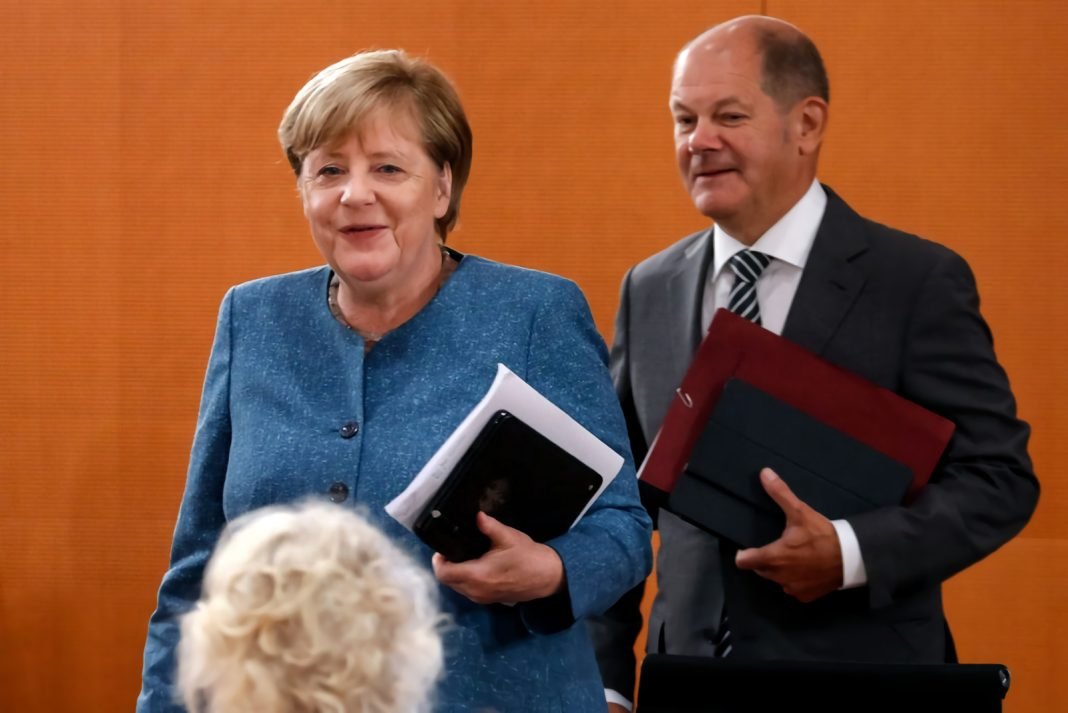Angela Merkel has held the post of German Chancellor for four consecutive terms, longer than any other politician since 2005. Now, she is resigning from politics. As stated in the Economist, at 18h00 hours on 26 September, the atrium of the Willy Brandt House, the Berlin headquarters of Germany’s Social Democratic Party (SPD), erupted in cheers when an exit poll suggested it had won the country’s federal election.
According to the BBC, the German Social Democrats have narrowly defeated the Conservative Party, prompting the winning party of Olaf Scholz to start negotiations with other parties to form a coalition government. The outcome of the talks, which may take several months, will determine the replacement of German Chancellor Angela Merkel, who has been at the helm of power in Berlin for 16 years.On Monday, 27 September, it was reported that Olaf Scholz, the candidate of the winning Social Democratic Party, was seeking talks with the Green Party and the Liberals. Negotiations between the parties to form a coalition government could take months, during which Angela Merkel will remain German Chancellor.
As stated in the Guardian, on Wednesday 6 October 2021, Olaf Scholz has come a step closer to succeeding Angela Merkel as German chancellor after the Greens and liberals announced their readiness to enter formal coalition talks with the SPD. Will Merkel leaving and the Social Democrats taking power in Germany overshadow German-British relations?
Germany: A Heavyweight in the European Union
Germany, as one of the most important European countries and one of the founders of the European Union, plays an important role in the international arena. As Europe’s economic power, Germany plays an influential role in Europe and the international system. Germany, with its influential role in the union and with its many geographical, political and institutional features, is one of the most important drivers of the convergence engine.
As stated in the European Council on Foreign Relations (ECFR), Angela Merkel’s approach to searching for compromises between competing interests is a major source of Berlin’s positive image. Pluralists in all countries polled would support her in a hypothetical election for president of Europe if her opponent was Emmanuel Macron.
Merkel’s rule has reduced its neighbours’ fears of German dominance. Most Europeans do not believe a German heading the European Commission is a bad thing. And significant numbers trust Berlin to lead the EU, especially on financial and economic issues, democracy and the rule of law.
Scholz and the Social Democrats’ Negative View of Britain and Brexit
Merkel sought to strike a balance between British and European Union diplomacy. The Social Democrats, however, may move further towards divergence with Britain. According to the Spiegel, in 2020, Scholz warned of serious consequences for the British economy. He added that negotiations between the EU and Great Britain are – once again – at a dead end. Serving Finance Minister Scholz saw the EU as being well prepared for a no-deal Brexit. British Prime Minister Johnson must be concerned. German Deputy Chancellor and Finance Minister Olaf Scholz (SPD) had warned Great Britain of the consequences of failed talks with the EU on a trade agreement. An unregulated situation would “Have very significant consequences for the British economy,” said Scholz after the meeting of EU finance ministers in Berlin on Saturday. However, he does not expect “Any particularly serious consequences” for the EU in view of the good preparations for such a no-deal scenario.
Macron’s Negative View of Britain and Brexit
Macron and Scholz’s shared negative views on Britain and Brexit could increase tensions on both sides of the North Sea between Britain and the Union. Similar to Sholz, Emmanuel Macron holds an anti-Brexit position. In a letter to European citizens published at the Elysée on 4 March 2019, Macron stated “‘Never, since the Second World War, has Europe been as essential. Yet never has Europe been in so much danger. Brexit stands as the symbol of that. It symbolises the crisis of Europe, which has failed to respond to its peoples’ needs for protection from the major shocks of the modern world”.
Scholz and Macron’s Stance: Tensions with Britain
Merkel sought to strike a balance of diplomacy between Britain and the European Union. But the Social Democrats may move further towards divergence with Britain. According to the Politico, Angela Merkel’s farewell visit to Downing Street in early July also injected new impetus into the British-German relationship, with the chancellor announcing her country’s willingness to work on “A friendship treaty or cooperation agreement” reflecting “The entire bandwidth of relations.”
Macron and Scholz’s shared negative views on Britain and Brexit could increase tensions on both sides of the North Sea between Britain and the European Union. Jan Germen Janmaat, professor of political socialisation at University College London, told that the candidates in the German election 2021 could forge stronger ties with the EU. He added “A reinforced and emboldened EU with a Franco-German axis may bring some new tensions in relations with Britain.”

